Place des Martyrs, Brussels
Martyrs' Square (French: Place des Martyrs, Dutch: Martelaarsplein) is a square in central Brussels, Belgium. Its current name refers to the martyrs of the September days of the Belgian Revolution of 1830.
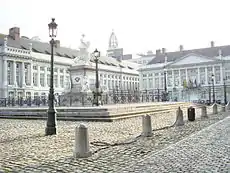 Martyrs' Square in Brussels | |
 Location within Brussels | |
| Location | City of Brussels, Brussels-Capital Region, Belgium |
|---|---|
| Quarter | Marais–Jacqmain Quarter |
| Coordinates | 50°51′05″N 04°21′22″E |
| Construction | |
| Completion | c. 1778 |
Originally, the square was called the Place Saint-Michel/Sint-Michielsplein after Saint Michael, patron saint of the City of Brussels. It was laid-out in a uniform neoclassical style in the years 1774–78, based on the designs of the architect Claude Fisco. Over 400 heroes of the Belgian Revolution of 1830 lie buried in a crypt beneath the cobblestones. Many lie not far from where they were shot, in fierce battles amid the Brussels streets and barricades. Today, the square is home to cabinet offices of the Flemish Government, including those of the Flemish Minister-President, as well as a theatre; the Théâtre des Martyrs.[1]
Martyrs' Square is located near Rue Neuve/Nieuwstraat, Belgium's second busiest shopping street.[2][3] It is served by De Brouckère metro station on lines 1 and 5 of the Brussels metro.
History
Early history
In 1773, the City of Brussels, which had acquired the plot of a former laundry, commissioned the architect Claude Fisco, controller of the works of the city, to build a new neoclassical square, called the Place Saint-Michel/Sint-Michielsplein ("Saint Michael's Square"). The works, which also involved digging several arteries, lasted from 1774 to 1776. In 1795, under the French regime, street and place names with any sort of religious connotation were changed, and the square was temporarily renamed the Place de la Blanchisserie/Blekerijplein ("Laundry Square").
The layout of the square was modified several times over the centuries. Originally, it was a paved and "empty" square, as seen in engravings from the late 18th century. In 1802, linden trees were planted. In 1830, after the first victims of the Belgian Revolution had been buried there, the provisional government decided, in 1831, to turn the square into a national commemoration place for the victims of the Revolution. The Monument to the Martyrs of the 1830 Revolution, also known as the Pro Patria monument, was erected in 1836–38. Carved by the court sculptor of King Leopold I, Guillaume Geefs, it includes a statue and crypt.[4]
The construction of the Martyrs' Monument led to a radical alteration of the square and its name was changed definitively to the Place des Martyrs/Martelaarsplein ("Martyrs' Square"). In 1839, the addition of gardens on both sides of the Monument changed the square's appearance once again, then in 1841, the installation of fountains, which were replaced by pools in 1841.
20th century–present

Martyrs' Square, including the facades and roofs of the buildings, as well as the Martyrs' Monument, were designated a historic site on 10 June 1963.[5] In 1979–80, the square was partially restored to its original appearance and was repaved.
In recent years, several cabinet offices of the Flemish Government, including those of the Flemish Minister-President set up residence on Martyrs' Square. In 1998, a theatre; the Théâtre des Martyrs, was inaugurated.[1]
Monuments
Several commemorative monuments are located on Martyrs' Square:
- the Monument to the Martyrs of the 1830 Revolution or Pro Patria monument, commemorating the victims of the Belgian Revolution, by Guillaume Geefs and Louis Roelandt (1836–38)[4]
- the Monument to Jenneval, honouring Alexandre Dechet (commonly known as Jenneval), the author of the text of The Brabançonne; Belgium's national anthem, by Alfred Crick and Émile Anciaux (1897)[6]
- the Monument to Count Frederic of Merode, in Art Nouveau style, dedicated to Count Frederic of Merode, by Paul Du Bois and Henry Van de Velde (1898)[7]
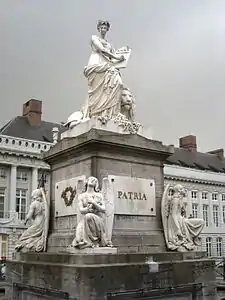 Monument to the Martyrs of the 1830 Revolution by Guillaume Geefs (1836–38)
Monument to the Martyrs of the 1830 Revolution by Guillaume Geefs (1836–38)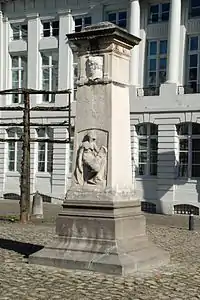 Monument to Jenneval by Alfred Crick and Émile Anciaux (1897)
Monument to Jenneval by Alfred Crick and Émile Anciaux (1897)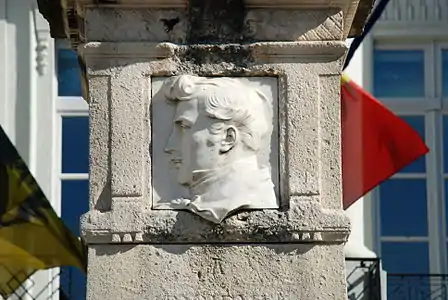 Effigy of Jenneval
Effigy of Jenneval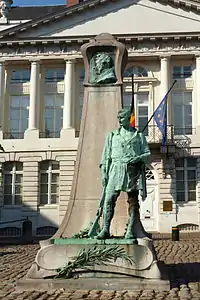
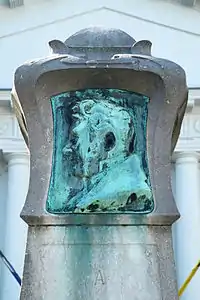 Bronze medallion bearing the image of Frederic of Merode
Bronze medallion bearing the image of Frederic of Merode
See also
References
- Martyrs, Théâtre des. "Théâtre des Martyrs" (in French). Retrieved 2020-07-01.
- "Rue Neuve most popular shopping street". www.xpats.com. 2013-09-19. Retrieved 18 October 2017.
- "Meir klopt voor het eerst Nieuwstraat als drukste winkelstraat". De Standaard (in Dutch). Retrieved 18 October 2017.
- "Bruxelles Pentagone - Monument aux Martyrs de la révolution de 1830 - Place des Martyrs - ROELANDT L." www.irismonument.be. Retrieved 2020-06-12.
- "Bruxelles Pentagone - Monument aux Martyrs de la révolution de 1830 - Place des Martyrs - ROELANDT L." www.irismonument.be. Retrieved 2018-12-08.
- "Bruxelles Pentagone - Monument à Jenneval - Place des Martyrs - ANCIAUX E." www.irismonument.be. Retrieved 2020-06-12.
- "Bruxelles Pentagone - Monument au comte F. de Merode - Place des Martyrs - VAN DE VELDE Henry". www.irismonument.be. Retrieved 2020-06-12.